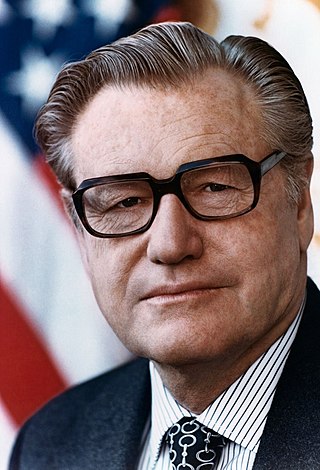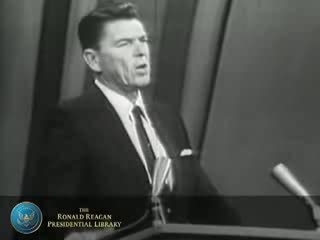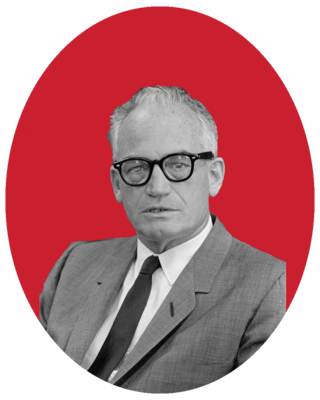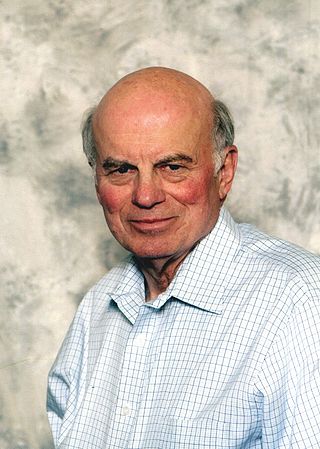Related Research Articles

Barry Morris Goldwater was an American politician and major general in the Air Force Reserve who served as a United States senator from 1953 to 1965 and 1969 to 1987, and was the Republican Party's nominee for president in 1964.

The 1964 United States presidential election was the 45th quadrennial presidential election. It was held on Tuesday, November 3, 1964. Incumbent Democratic President Lyndon B. Johnson defeated Senator Barry Goldwater, the Republican nominee, in a landslide. Johnson was the fourth and most recent vice-president to ascend to the presidency following the death of his predecessor and to win a full term in his own right. With 61.1% of the popular vote, Lyndon B. Johnson won the largest share of the popular vote for the Democratic Party in history, and the highest for any candidate since the advent of widespread popular elections in the 1820s.

The Rockefeller Republicans were members of the United States Republican Party (GOP) in the 1930s–1970s who held moderate-to-liberal views on domestic issues, similar to those of Nelson Rockefeller, Governor of New York (1959–1973) and Vice President of the U.S. (1974–1977). Rockefeller Republicans were most common in the Northeast and the industrial Midwestern states, while they were rare in the South and the West.

Young Americans for Freedom (YAF) is a conservative youth activism organization that was founded in 1960 as a coalition between traditional conservatives and libertarians on American college campuses. It is a 501(c)(3) nonprofit organization and the chapter affiliate of Young America's Foundation. The purposes of YAF are to advocate public policies consistent with the Sharon Statement, which was adopted by young conservatives at a meeting at the home of William F. Buckley in Sharon, Connecticut, on September 11, 1960.

"A Time for Choosing", also known as "The Speech", was a speech presented during the 1964 U.S. presidential election campaign by future president Ronald Reagan on behalf of Republican candidate Barry Goldwater. "A Time for Choosing" launched Reagan into national prominence in politics.

John Milan Ashbrook was an American politician and newspaper publisher. A member of the Republican Party, he served in the United States House of Representatives from Ohio from 1961 until his death. Ashbrook was associated with the New Right. He ran against President Richard Nixon in the 1972 Republican Party presidential primaries, attempting to appeal to voters who believed Nixon was insufficiently conservative, but he failed to win any statewide contests. At the time of his death, he was running for U.S. Senate in Ohio in the 1982 election.

James Lane Buckley was an American politician and judge who served in the United States Senate as a member of the Conservative Party of New York State in the Republican caucus from 1971 to 1977 and additionally held multiple positions within the Reagan administration. He was also the Republican nominee in the 1980 Connecticut Senate race, but he was defeated by Democrat Chris Dodd.

William Allen Rusher was an American lawyer, author, activist, and conservative columnist. He was one of the founders of the conservative movement and was one of its most prominent spokesmen for thirty years as publisher of National Review magazine, which was edited by William F. Buckley Jr. Historian Geoffrey Kabaservice argues that, "in many ways it was Rusher, not Buckley, who was the founding father of the conservative movement as it currently exists. We have Rusher, not Buckley, to thank for the populist, operationally sophisticated, and occasionally extremist elements that characterize the contemporary movement."

The 1964 Republican National Convention took place in the Cow Palace, Daly City, California, from July 13 to July 16, 1964. Before 1964, there had been only one national Republican convention on the West Coast, the 1956 Republican National Convention, which also took place in the Cow Palace. Many believed that a convention at San Francisco indicated the rising power of the Republican Party in the west.

Richard Art Viguerie is an American conservative figure, pioneer of political direct mail and writer on politics. He is the current chairman of ConservativeHQ.com.

From January 19 to June 8 1976, voters of the Republican Party chose its nominee for president in the 1976 United States presidential election. The major candidates were incumbent President Gerald Ford and former Governor of California Ronald Reagan. After a series of primary elections and caucuses, neither secured a majority of the delegates before the convention.
The 1964 presidential campaign of Barry Goldwater began when United States Senator Barry Goldwater of Arizona elected to seek the Republican Party nomination for President of the United States to challenge incumbent Democratic President Lyndon B. Johnson. Early on, before officially announcing his candidacy for the presidency, Goldwater was accused by Governor of New York Nelson Rockefeller of attempting to galvanize Southern and Western Republican support while neglecting the industrial northern states, eventually becoming one of Goldwater's primary opponents in the race for the Republican Party's nomination in 1964.
Movement conservatism is a term used by political analysts to describe conservatives in the United States since the mid-20th century and the New Right. According to George H. Nash (2009) the movement comprises a coalition of five distinct impulses. From the mid-1930s to the 1960s, libertarians, traditionalists, and anti-communists made up this coalition, with the goal of fighting the liberals' New Deal. In the 1970s, two more impulses were added with the addition of neoconservatives and the religious right.

From March 10 to June 2, 1964, voters of the Republican Party elected 1,308 delegates to the 1964 Republican National Convention through a series of delegate selection primaries and caucuses, for the purpose of determining the party's nominee for president in the 1964 United States presidential election.
Richard Nixon served as the 37th president of the United States from 1969 to 1974. He previously served as the 36th vice president of the United States from 1953 to 1961, and as a United States senator from 1950 to 1953 and United States representative from 1947 to 1950.

The 1966 New York gubernatorial election was held on November 8, 1966 to elect the Governor and Lieutenant Governor of New York. Incumbent Republican Nelson Rockefeller won reelection. As of 2022, this is the last time Manhattan voted for a Republican in a statewide election.

A Choice Not an Echo is a non-fiction book self-published in 1964 by movement conservative activist Phyllis Schlafly. It was the first of Schlafly's 19 authored texts, and sold 3 million copies, granting her national attention as a conservative activist. Schlafly mainly published this book in support of Arizona Senator Barry Goldwater, hoping to help him triumph in the California primary, thus granting him the ability to be nominated for president. Schlafly's secondary motivation behind the publishing of A Choice Not an Echo was to break control of the "Eastern Establishment" over the Republican Party. In other words, this book served as an exposition of the covert influence that "kingmakers" had on Republican primary nominations.
The Draft Goldwater Committee was the organization primarily responsible for engineering the nomination of Arizona Senator Barry Goldwater for President of the United States on the 1964 Republican Party ticket.

This timeline of modern American conservatism lists important events, developments and occurrences which have significantly affected conservatism in the United States. With the decline of the conservative wing of the Democratic Party after 1960, the movement is most closely associated with the Republican Party (GOP). Economic conservatives favor less government regulation, lower taxes and weaker labor unions while social conservatives focus on moral issues and neoconservatives focus on democracy worldwide. Conservatives generally distrust the United Nations and Europe and apart from the libertarian wing favor a strong military and give enthusiastic support to Israel.
Denison Kitchel was a lawyer from Phoenix, Arizona, who was an influential advisor to and the campaign manager of Republican Barry M. Goldwater in the 1964 U.S. presidential campaign against the Democrat Lyndon B. Johnson.
References
- 1 2 3 Lambert, Bruce, "F. Clifton White, 74, Long a Republican Strategist", The New York Times, 10 January 1993.
- ↑ "History".
- ↑ Hodgson, Godfrey, William Rusher obituary", guardian.co.uk, 18 April 2011 17.53 BST. Retrieved 2011-04-19.
- ↑ Hartz, Jay, "The Political Education of John M. Ashbrook" Archived 2012-03-20 at the Wayback Machine ; On Principal Special Edition for 15th Anniversary of the Ashbrook Center (1998); pp. 11-12. Retrieved 2011-04-21.
- ↑ White, F. Clifton, with William J. Gill, Suite 3505: The Story of the Draft Goldwater Movement (New Rochelle: Arlington House, 1967; Ashbrook Press, 1992). The Ashbrook Press is part of the Ashbrook Center Ashland University, where White's [papers also reside "Archived copy" (PDF). Archived from the original (PDF) on 2012-03-20. Retrieved 2011-04-21.
{{cite web}}: CS1 maint: archived copy as title (link)]; On Principal Special Edition for 15th Anniversary of the Ashbrook Center (1998); Press p. 3 and papers p. 4. Retrieved 2011-04-21. - ↑ Will, George, "The Cheerful Malcontent", Washington Post, 31 May 1998. Goldwater quoted in column.
- ↑ White, Theodore H., The Making of the President 1964, (New York: Atheneum Publishers, 1965), p. 332n.
- ↑ White, F. Clifton, with William J. Gill, Suite 3505: The Story of the Draft Goldwater Movement, p. 415 and pp. 408-421 generally.
- ↑ Buckley, James L., If Men Were Angels: A View From the Senate (New York: G.P. Putnam's Sons, 1976), p. 25
- ↑ White, Theodore H., The Making of the President 1964, pp. 90-96.
- ↑ Suite 3505, book page at Ashbrook Center website. Retrieved 2011-04-21.
- ↑ White, F. Clifton, with William J. Gill, Suite 3505: The Story of the Draft Goldwater Movement.
- ↑ White, F. Clifton, with William J. Gill, Why Reagan Won: The Conservative Movement 1964-81, (Chicago: Regnery Gateway, 1981).